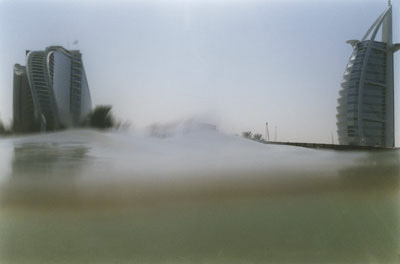
Since 2001 Japanese photographer Asako Narahasi has been working on the suite "half awake and half asleep in water," which trades on our millennial ties to the terra firma and the water's edge, and toys with art history's related fascination with land and seascapes. Each image places viewers inside a mass of churning ocean that fills three-quarters of a foreground pressed up close to the viewing plane. We're situated in water far from an implied shoreline occluded by the height of the liquid churning around us. A horizon is inferred only via those remnants of dry land tall enough to be seen, both natural (a snow capped peak out of Hokusai) and engineered (the tips of corporate headquarters and urban sprawl). Because of how skillfully, poetically and eccentrically these images are conceived, we don't immediately consider that they are made with a water proof camera while Narahasi is partially submerged in deep oceans and lakes, bobbing like a cork for long periods and gazing toward land until these perfectly calibrated spatial and emotional relations present themselves in her view finder. These remarkable images suggest either a moment of being suspended freely in water--relaxed, unperturbed, drifting farther and farther away from land by choice--or that moment when resistance is relinquished and someone drowning gets a last glimpse of land. These very opposing senses interchange freely in any one work, raising the enterprise above simple aesthetics or eco-irony.
The artist has mastered the cumbersome process to the extent that angles are selectively skewed, forms are strategically blurred, light is masterfully captured so chilly blues, grays and greens get bathed in that oscillating sea sun that's sublime and hallucinogenic. Makuhari (2001) shows one spindly high-rise quite far away yet looking as if it will be submerged in a few more frames. In Mekari (2004), a tumbling mass of liquid and light nearly overtake the entire foreground; a suspension bridge pitching left overhead feels like a quick detail we might glimpse as we take in our last good gasp before drowning. Prophetic given recent headlines, Jumeirah Beach, Dubai (2009) captures that city's pretentious architecture as hazy, minute geometry making a futile stand against a rising mist. The sheer skill and intense beauty with which Narahasi records the abstract play of time, light and shadow on liquid is by itself remarkable; stunning is her knack for evoking millennial, existential and currently popular conundrums regarding humanity in and out of sync with our planet.
Published courtesy of art ltd. ©2009
